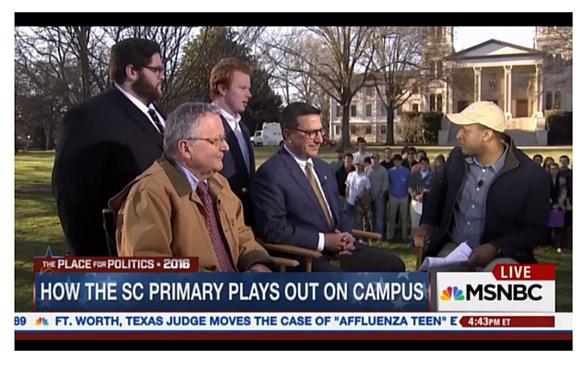By: Anna Aguillard, Senior Writer
On Friday, Feb. 19, alumnus and board member Craig Melvin visited Wofford for a reason wholly unconnected to the semi-annual board meeting .With an MSNBC media truck in tow, Melvin and his crew set up a stage on Campus Drive to interview students and faculty on the approaching South Carolinian presidential primaries.
Reporting from the lawn in front of Old Main, Melvin asked questions to students representing five of the current top contenders, as well as Dr. Robert Jeffrey, professor of government, and Dr. Nayef Samhat, president of the College.
Samhat recapped the candidates that Wofford has hosted this year, noting the “terrific opportunity” that students have to participate in the political process at Wofford, a campus with a long history of political engagement.
After revealing that Jeffrey’s Con Law class was one of his “favorite at Wofford,” Melvin asked Jeffrey to speak as a political observer on the difference between the current presidential race and the ones he has followed before.
“This is the year of the insurgent,” he said, referring to Trump.
Cole Shannon, senior and chairman of the College Republicans, was the first student interviewed. When asked which candidate he supported, he replied without hesitation: “Marco Rubio.”
“His motto of a ‘New American Century’ is really inspiring. He doesn’t just have a motto, he has a message. My generation, most of us, were born in the mid-nineties. We grew up in a time of the Clinton impeachment trial, turned to the 2000s experiencing 9-11, the Bush-Gore recount, followed by two wars and a recession. His promise of a ‘New American Century’ hasn’t been realized yet, and he’s got an opinion, a message and policy prescriptions to take us there,” said Shannon.
When asked about Rubio’s young age – a point often used to criticize the 44-year-old senator from Florida – Shannon said that JFK and Teddy Roosevelt were younger than Rubio, and “made great Presidents.”
Next, Melvin turned to Tucker Lawson, chairman of the College Democrats, who said that he is “feeling the Bern.”
“Bernie is a proven progressive, you can look at his records for the past 40 years… He fought for economic equality, and I think that his platform is built on equality and justice, and as a young adult, I want to live in a society that has equality and justice. I want to raise my kids in a society that has equality and justice,” said Lawson.
When asked whether or not he thought Hillary Clinton’s political policies would bring enough equality to the country, Lawson pointed to Sanders’s lasting experience and campaign fundraising methods.
“Bernie has been doing it for longer,” he said, “and he doesn’t have big money behind him. He isn’t taking money from big businesses or banks. His beliefs are his beliefs.”
Representing Clinton, Donovan Hicks said that he supports Clinton because of her electability.
“I think that she has a political pull to pull moderates and right wing voters to vote for her. She’s not scary from the left side, she’s a person who has been in politics, she’s well accustomed. She has the realistic ability to win the presidency,” said Hicks.
Charlie Wedding spoke to voice his support of Ted Cruz, an argument that Melvin said was “quite well-versed.”
“What I like about Ted Cruz is that he is a consistent, proven conservative on the issues that matter to conservative voters, and the people at large, for that matter,” said Wedding. “He understands something very important: the interests of our political and financial elites do not necessarily match the national interests, or the interests of the people.”
Guthrie McQueen was the last student interviewed. After commenting on McQueen’s “sharp” suit, Melvin asked McQueen to respond to criticisms on Trump’s demeanor.
“I think that in a campaign, and in a political spectrum, being abrupt is the way that he [Trump] has been able to express himself, and gain support,” said McQueen.
McQueen said that, like Hicks in regards to Clinton, he also believes that Trump is electable in a general election.
“He can pull voters that might not just be Republicans, but independents and Democrats, because of his background as a businessman, not just a mainstream politician in Washington. And I think that is appealing to voters,” said McQueen.
So far, McQueen seems to be correct, as Trump’s sweeping victory in the Republican primary that occurred the next day has proven. Trump received 32.5 percent of the vote, winning all 50 delegates for the upcoming convention over the summer.
Rubio followed at 22.5 percent, giving a victory speech following his close rise to second over Cruz (at 22.3 percent). The same night, Jeb Bush suspended his campaign after receiving 7.8 percent of the vote, putting him in a far fourth place.
Clinton stormed South Carolina with 73.5 percent of the Democratic vote, leaving Sanders with 26 percent.
Although the election seemed largely up in the air until now, candidates seem to be falling into some semblance of order. By the time this article goes to print, Super Tuesday will have occurred, and we may finally have a telling idea of the nominees for the national election.
CAPTION: Melvin interviews Samhat, Jeffrey, Lawson and Shannon during an MSNBC bit on the South Carolina primaries.



























